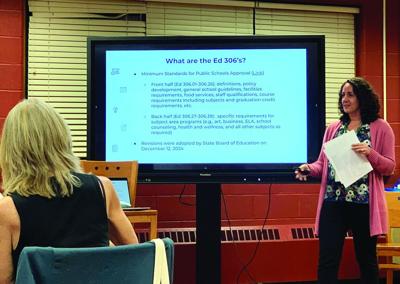BRISTOL — The Newfound Area School District was one of the first three in New Hampshire to adopt “competency-based education,” keeping the Lakes Region Curriculum Instruction & Assessment organization in the forefront of implementing new guidelines from the state Department of Education.
In competency-based education, instruction, assessment, and academic reporting focus on students being able to demonstrate a specified level of knowledge and skills before progressing to the next stage. The New Hampshire Department of Education now incorporates such requirements into its list of school standards.
“[It’s] really taking the lead and really setting the tone for the whole state,” said Newfound Superintendent Paul Hoiriis. “So we have a strong group that, even at the state level, is referred to, like, ‘What are the Lakes folks doing?’”
Ariel Maloney, curriculum administrator in Newfound, gave a presentation on “Ed 306es” — the state’s education code — to the school board on Oct. 14, explaining her proposal for adjusting to the new standards. Newfound already is ahead of many school districts in moving away from “seat-time credits” to proof of mastery.
The new state academic standards dictate the knowledge and skills students must attain, but local school districts are free to implement alternative standards “that meet at least the level of rigor of the academic standards adopted by the state board.”
“Unfortunately, the Department of Education is not providing a lot of guidance, so we’re doing a lot of sort of grassroots decision-making around this,” she said. “We felt really confident as a team from Newfound that we’re in a really, really strong place to make these shifts in order to achieve the spirit of the 306 revisions.”
Maloney explained that national standards establish broad goals for subjects such as math and science, giving states a choice of adopting them or creating their own. “Often the standards are aligned to specific state accountability assessments, the SAS or the SAT, for example,” she said; but the school curriculum “lives at the district level, and then those things establish our lesson plans, what we’re teaching, and how we’re adopting the competencies that align with the guidelines at the state and the national level.”
She said curriculum administrators are working at “ensuring that our local competencies are in line with the 306es, but also give that flexibility to move beyond just what the Department of Education has formally approved.”
Maloney continued, “We had developed, as a Lakes Region curriculum-instruction administrators group, some sample language around performance indicators and some possible pathways. We’re also looking at continuing to work with these, like regional- and state-level groups ... because we also know we have a transitory population, and kids move between districts in some cases, and so we want to make sure that the way Newfound is going forward, that is not going to be that dissimilar from the way Winnisquam would award it, versus the way that Plymouth is going to award it, so that it’s easy as kids move [between] districts to, like, look at transcripts and make sure that students are getting accurate credit.”
New graduation standards will begin with the class of 2027, but it will be this year’s eighth graders who will see full implementation of the changes. Those include half-credits in U.S. and NH history; logic and rhetoric; civics; economics; financial literacy; and health and wellness. The current four-credit English requirement will be split into 3.5 credits with a half-credit in writing. The current half-credit requirement in world history, global studies, or geography will become a full credit.
Leah McFarland, student representative to the school board, asked whether the new graduation requirements would affect electives, many of which are offered by the Social Studies team.
“Would that take away from our electives?” she asked.
Saying it “is certainly a point of discussion,” Maloney said the credit requirements are “competencies and not courses,” which provides some flexibility.
“Students aren’t required to take a course in logic and rhetoric. They’re required to earn a half of competency in that,” Maloney said. “The Holocaust and genocide studies is a really great example as well. There is [a state law] that dictates that that must be a course that is offered in high school, but the [state] board did not put it as a credit requirement.”
She noted that, taking an interdisciplinary approach, individual classes could take on portions of the competencies, so that altogether, they meet the requirements.
“We have many models of interdisciplinary learning, such as our senior project program, the Acadia trip which students presented about so eloquently a couple weeks ago, and the work we’re doing as part of this process is in conjunction with and supporting our other district and school initiatives,” she said.
Hoiriis said the administrative team has done a lot of work to answer such questions with, “Based on the adoption of the 306es, these are what are some of our courses are going to look like in order to meet those requirements.”
Maloney’s presentation included a recommendation for adopting additional academic standards developed by some national educational organizations, “not to replace, but to support the work that we’re going to do moving forward.”
The school board plans to take up the request at its next meeting, scheduled for Monday, Oct. 27.


















(0) comments
Welcome to the discussion.
Log In
Keep it Clean. Please avoid obscene, vulgar, lewd, racist or sexually-oriented language.
PLEASE TURN OFF YOUR CAPS LOCK.
Don't Threaten. Threats of harming another person will not be tolerated.
Be Truthful. Don't knowingly lie about anyone or anything.
Be Nice. No racism, sexism or any sort of -ism that is degrading to another person.
Be Proactive. Use the 'Report' link on each comment to let us know of abusive posts.
Share with Us. We'd love to hear eyewitness accounts, the history behind an article.